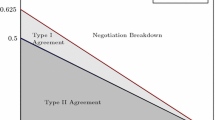Abstract
The tripartite bargaining problem of mutual deterrence has been investigated from the perspective of Rubinstein indefinite bargaining and cooperative game theory. Considering the situation of incomplete information in reality, this paper established a tripartite mutual deterrence bargaining model with unilateral and bilateral incomplete information by introducing incomplete information into the model and defining a discount factor. And particularly, the formula is furnished for calculating the Nash equilibrium distribution of every player under the incomplete information. Finally, an illustrative example is presented to show that the established model is feasible and effective and can provide a new way and method to analyze and solve multi mutual deterrence or conflict problems with incomplete information.
Access this chapter
Tax calculation will be finalised at checkout
Purchases are for personal use only
Similar content being viewed by others
References
Schelling, T.: Arms and Influence, pp. 120–123. Yale University Press, New Haven (1966)
Nash, J.F.: The bargaining problem. Econometrica 18, 155–162 (1950)
Rubinstein, A.: Perfect equilibrium in a bargaining model. Econometrica 50, 97–109 (1982)
Kalandrakis, A.: A three-player dynamic majoritarian bargaining game. J. Econ. Theor. 116(2), 194–322 (2004)
Calvo-Armengol, A.: A note on three players noncooperative bargaining with restricted pairwise meetings. Econ. Lett. 65(1), 47–54 (1999)
Xiang, G.H., Wang, Y.X.: A bargaining model of mutual deterrence with incomplete information. Oper. Res. Manag. Sci. 17(6), 16–19 (2009)
Gong, Z.Q., Xie, Z., Dai, L.: A bargaining model of mutual deterrence between three players. J. Quant. Econ. 32(2), 87–92 (2015)
Harsanyi, J.C.: Games with incomplete information played by “Bayesian” players. Manag. Sci. 14(3), 159–182 (1967)
Yu, W.S.: Game Theory and Economy, pp. 115–127. Higher Education Press, Beijing (2007)
Li, D.F.: Fuzzy Multiobjective Many-Person Decision Makings and Games. National Defense Industry Press, Beijing (2003)
Zagare, F.C., Kilgour, D.M.: Alignment patterns, crisis bargaining, and extended deterrence: a game-theoretic analysis. Int. Stud. Q. 47(4), 587–615 (2003)
Zhang, Z.Y., Li, Z.Y., Long, Y.: Empirical study on enterprise bargaining power in skill-based competitive strategic alliances. J. Syst. Eng. 22(2), 148–155 (2007)
Zhou, J.X., Wang, Y.: Research on bargaining problem between a disadvantaged wholesaler and a supplier under asymmetric information. J. Syst. Eng. 31(4), 481–493 (2016)
Li, D.-F.: Multiattribute group decision-making methods with intuitionistic fuzzy sets. In: Li, D.-F. (ed.) Decision and Game Theory in Management With Intuitionistic Fuzzy Sets. SFSC, vol. 308, pp. 251–288. Springer, Heidelberg (2014). doi:10.1007/978-3-642-40712-3_6
Fontenay, C.C.D., Gans, J.S.: Bilateral bargaining with externalities. J. Ind. Econ. 62(4), 756–788 (2014)
Bayati, M., Borgs, C., Chayes, J., et al.: Bargaining dynamics in exchange networks. J. Econ. Theor. 156(2), 417–454 (2015)
Aghadadashli, H., Wey, C.: Multiunion bargaining: tariff plurality and tariff competition. J. Inst. Theor. Econ. (JITE) 171(4), 666–695 (2015)
Collard-Wexler, A., Gowrisankaran, G., Lee, R.S.: “Nash-in-Nash” bargaining: a microfoundation for applied work. Eur. J. Pharm. Biopharm. 71(2), 339–345 (2014)
An, B., Gatti, N., Lesser, V.: Alternating-offers bargaining in one-to-many and many-to-many settings. Ann. Math. Artif. Intell. 77(1), 1–37 (2016)
Abreu, D., Pearce, D., Stacchetti, E.: One-sided uncertainty and delay in reputational bargaining. Theor. Econ. 10(3), 719–773 (2015)
Acknowledgement
This work was supported by the Key Project of Natural Science Foundation of China (Grant Nos. 71231003).
Author information
Authors and Affiliations
Corresponding author
Editor information
Editors and Affiliations
Rights and permissions
Copyright information
© 2017 Springer Nature Singapore Pte Ltd.
About this paper
Cite this paper
Xiao, Y., Li, DF. (2017). Bargaining Model of Mutual Deterrence Among Three Players with Incomplete Information. In: Li, DF., Yang, XG., Uetz, M., Xu, GJ. (eds) Game Theory and Applications. China GTA China-Dutch GTA 2016 2016. Communications in Computer and Information Science, vol 758. Springer, Singapore. https://doi.org/10.1007/978-981-10-6753-2_4
Download citation
DOI: https://doi.org/10.1007/978-981-10-6753-2_4
Published:
Publisher Name: Springer, Singapore
Print ISBN: 978-981-10-6752-5
Online ISBN: 978-981-10-6753-2
eBook Packages: Computer ScienceComputer Science (R0)




